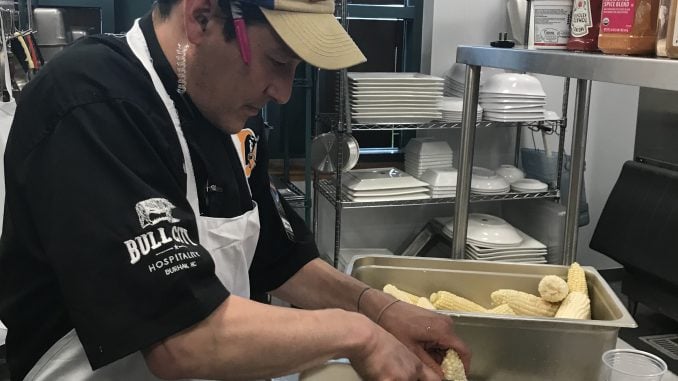
DURHAM — It’s 4:30 in the afternoon. Thanks to the threat of inclement weather, gates at Durham Bulls Athletic Park will open in an hour, 30 minutes earlier than originally scheduled. Despite being on the job for nearly nine hours, chef Curtis Wong begins cooking his first dish.
That’s not to say the kitchens haven’t been active. Quite the contrary, the first burgers hit the grill in the production kitchen, located adjacent to the grounds crew pit in right field, at 10 a.m. Before that, someone else had prepared hundreds of chicken patties.
“We can’t have the same guy prepare burgers and chicken,” Wong explained. “He collapsed from dehydration a few times last year.” That’s when Wong decided to hire an overnight cook to man the grill, making the Durham Bulls kitchens close to a 24-hour shop — and that’s for the team’s normal schedule of night games. In two days, the Bulls will have a 10:30 a.m. first pitch, hosting field trip groups from local schools that will pack the ballpark with more than 6,000 hungry kids.
“I’ll spend the night here,” Wong said. “I’ll sleep on a couch in the Duke Baseball clubhouse and be up by 4:30, cooking hot dogs in my pajamas.”

Wong is responsible for two kitchens and supplies food to everything except the concession stands. That includes the stadium party decks, the suites, the Triangle Club and the visiting team’s pregame and postgame spreads.
The larger production kitchen takes care of the ballpark food, while the upstairs kitchen, located next to the Triangle Club, supplies the fancier dishes. In his time running the kitchen for the Triangle Club, Wong has prepared such ritzy dishes as lobster ravioli, crawfish etouffee and caviar appetizers.
With the diverse dishes being prepared, Wong has a staff of about a dozen people working the two kitchens — seasonal workers grill meat, deep-fry chips and bake cookies (for dessert trays that go in each suite) in the production kitchen, while more experienced colleagues, drawn from his days in the restaurant world or recruited from PNC Arena and other sports venues in the area, do more creative work upstairs.
“Restaurants are a different animal completely,” Wong said. “The seasonal labor combined with mass production of few items is far removed from smaller restaurants. In a restaurant, it could take three or four steps to compose a dish. Here at the stadium, I have positions that will repeat one step for a five-hour shift.”
Prior to coming to the Bulls, Wong managed the dining halls at Duke, giving him experience in prepping for massive crowds of diners.
One of the biggest lessons Wong had to learn in both jobs was the importance of delegating work — even the fun work of preparing a menu — to his staff. For most of his day at the stadium, Wong is holding a cell phone, not a carving knife or spatula.
“My parents don’t really understand what I do,” Wong said. “My dad asks me, ‘So, do you spend all day cooking?’ Not exactly.”
So, what does Wong do all day?
“Have you ever seen ‘The West Wing’?” he answered.
Indeed, Wong is generally fighting about three fires — metaphorical ones, not grease flare-ups on the grill — at once, requiring a lot of walking and talking. By the time the gates opened, Wong had put in close to 9,000 steps and four miles, walking the stadium to monitor the kitchens and answer questions.
Wong’s first task of the day was getting the production kitchen up and running. Then he got to work planning for the next day’s truck order.
The DBAP gets daily truck deliveries from a food vendor — for the early-start day, the truck would deliver 110 cases of olive oil, capers, wing sauce, burger patties, canned tomatoes and more. The pantry is low on banana peppers and jalapenos, something that Wong will be told by three different kitchen workers — each approaching him with an urgent look of concern — throughout the day. “Another case is coming on today’s truck,” he assures each of them.
The bigger problem on this day is bread. Somehow the daily order of buns for burgers and dogs was short by several dozen pallets, meaning the concessions stands and Wong’s kitchens are scouring the stadium for more bread. The problem is exacerbated by the fact that kids day is about 40 hours away. The crew is already stocking up on cases of hot dogs for all the kids, storing them in all available freezer space. A bun shortage at this stage could throw planning for the early-morning game into chaos.
Wong gets word that a concession stand prep area has extra buns. He heads off to the far corner of the stadium to investigate, only to find that their stash — a couple pallets — is a drop in the bucket. He works the phone to try to get an emergency delivery from his vendor, then heads back to his computer to put the specifics of his request into the online order system. That system is already open as he spends the day trying to put together his truck order for the following afternoon. “We have to have that in by 3,” he says.
There’s a rotary luncheon in the Triangle Club, meaning that the upstairs kitchen will need to do two full meals — one for the lunch event and one for the evening’s game. Wong has called in a local chef to help handle the rotary affair and heads upstairs to check on the prep for the first meal — salmon with dill-caper cream sauce, pasta shells with marinara primavera, spicy stewed beans, an asparagus-carrot platter, Caesar salad and mini cupcakes.
The luncheon prep is going smoothly, but Wong gets a surprise when he checks the paperwork on a board next to the door. The ticket office has managed to sell three more suites for the night’s game, meaning Wong now has close to 100 more mouths to feed.
While this news would send the celebrity chefs from television into a wild storm of cursing, Wong takes the news in stride. He stops to take the world’s shortest coffee break, pouring barely enough coffee to cover the bottom of a Styrofoam cup, taking a quick sip, then moving on. Everything Wong does is on the move and ridiculously abbreviated — a smoke break consists of two puffs before the cell phone rings with an update on the emergency bread order, and the only food he eats all day are samples of what his kitchens are preparing, an odd chip or spoon of caper-dill sauce here and there.
As game time approaches, the production kitchen ramps down. The emergency bread arrived, along with the regularly scheduled truck. Tomorrow’s truck order went out. The last-minute suites received their food. The major work is done, and the remaining cooks prepare food for the front office, visiting clubhouse and grounds crew. Wong continues to dart between the two kitchens, taking ingredients and supplies with him on every trip.
Attention turns toward the Triangle Club evening meal. Wong has left a great deal up to the imagination of his upstairs cooks. His initial menu said, “Corkscrew shrimp with some kind of sauce.” Trina Kennedy, who he’s put in charge of the evening meal, pitches her idea to him — ditching the sauce and going with a dry rub instead. Wong gives her the green light and she sets off to prepare that, along with the rest of the menu — barbacoa beef, chipotle chicken, pork carnitas, corn and black bean salad, and a fennel/grapefruit/watercress salad that he seems to make up on the fly when he finally gets to do some food prep on his own.
Wong got into the business because he loved cooking, so it seems like it would be frustrating that he spends his days searching for bread and talking to vendors while other people cook his food. It also seems like coming up with fancy salads that fans will walk past as they go to get another hot dog and plate of nachos would be irritating, but Wong gets just as much of a thrill in seeing Kennedy come up with her own vision for the shrimp dish. He proudly says that any of the seasonal staff in the production kitchen “that survive the summer with me” usually end up wanting to work in the culinary industry.
“There is no feeling like jamming on a busy line in a restaurant that you can be proud of,” he admits. “Getting in whole fish, breaking it down, and watching it all come off your station at a pretty penny to people who waited to eat there is quite a feel-good. But that same intrinsic reward happens after a six-day stretch of high volume with endless trucks and 14-hour days. Knowing that your kitchen(s) safely fed over 2,500 in one day and was left neat and tidy to do it all over again tomorrow is just as much of a rush as working a busy station.”



